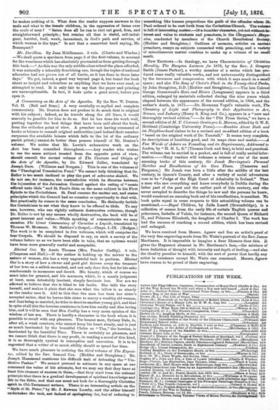A Commentary on the Acts of the Apostles. By the
Rev. W. Denton. Vol. II. (Bell and Sons.) A very carefully co mpiled and complete commentary. Mr. Denton does not profess to do much that is original with his subject ; indeed, as he travels along the old lines, it would scarcely be possible for him to do so. But he has done his work well, putting together' the best things that have been said about the book, from the orthodox point of view. A preacher not having command of books or leisure to consult original authorities (and indeed their number surpasses the available leisure which falls to the lot of the ordinary parish priest,) cannot do better than possess himself of Mr. Denton's volume. We notice that Mr. Lewin's exhaustive work on the Acts has been consulted throughout —Any reader who wishes to see the same subject treated from the opposite point of view, should consult the second volume of The Contents and Origin of the Attu of the Apostles, by Dr. Edward Zeller, translated by Joseph Dare. (Williams and Norgate.) This is one of the volumes of the "Theological Translation Fund." We cannot help thinking that Dr. Zeller is too much inclined to play the part of advocates diaboli. We do not see, for instance, the contradiction which he discerns between the injunction of the Jerusalem Council against the eating of "meats offered unto idols " and St. Paul's dicta on the same subject in his First Epistle to the Corinthians. St. Paul reasons the matter out, and states principles which the Council had no occasion or opportunity to deal with. But practically he comes to the same conclusion. He distinctly forbids the Corinthians to eat what they knew to be offered to idols. To any one, however, who can rightly estimate destructive criticism, though Dr. Zeller is not by any means wholly destructive, the book will be of great interest and value.—While speaking of commentaries we may mention The Great Commentary of Corneliue a Lapide, translated by Thomas W. Mosaman. St. Matthew's Gospel,—Chaps. L-IX. (Hodges.) The work is to be completed in five volumes, which will comprise the four Gospels. We should be disposed to say, on such a survey of the volume before us as we have been able to take, that an epitome would have been more generally useful and acceptable.






























 Previous page
Previous page